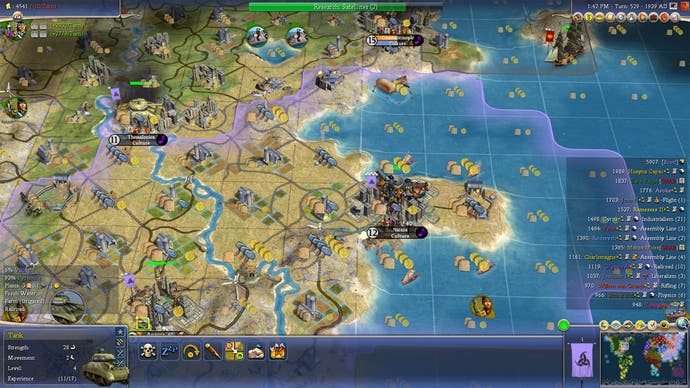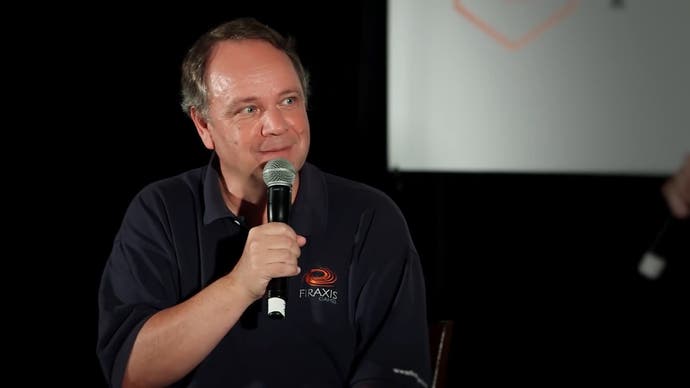25 years of Civilization: We talk with Sid Meier
"It's outgrown me. It's outgrown any one person."
Looking back across the Civilization series, things have changed dramatically in the 25 years since the first game hit shelves and set the benchmark for what it means to be a 'strategy game'. In that time we've seen Civ titles jump from 2D to 3D, introduce mods, online multiplayer and perhaps most importantly of all, hexagonal tiles. However, one thing has always remained a constant. One person has been there throughout this entire journey.
The game's original designer and the man with his name on the box, Sid Meier.
Ahead of the release of Civilization 6 on Friday, I spoke to Meier about why he chose to hand over the reigns as lead designer after his first attempt. You can join us both in the video below.
In the past when publishing interviews in this style, we've seen that some commenters would prefer to read a transcript rather than watch a lengthy video. Ideally, we'd like to offer both options with every interview, but that's not always the best use of our time. However, I think we can probably make an exception here. It is Sid Meier, after all.
So first of all, congratulations on 25 years of Civilization. That's an incredible achievement.
Sid Meier: Thank you! We certainly didn't imagine, back in the days of Civ 1, that we'd be around for 25 years. But it's really a compliment to our fans and the community and the support they've given us. Yeah, I think we do feel it's a special time to be able to release Civ 6. It's just very cool. Very cool.
Back when you were working on Civ 1, did you always know it was something you'd want to iterate on? Did you know there'd even be a Civ 2 at that stage?
Sid Meier: The answer is no. When I finished Civ 1, I was pretty much exhausted and ready to do something different. That's actually been the case with a lot of the Civ designers. You'll see a new person come along and take the reigns and add their energy and their new ideas to it. So, one of the things that's kind of unique about the Civ series is how, you know, I basically designed Civ 1 and then Brian Reynolds came and added his ideas to Civ 2, and then Jeff Briggs and Soren...
Every time there's been a new design team to take the core of the game and add some great new ideas to it. I think that's really what's given it's longevity. Every new Civ has had some really interesting, new features to it and that's what's kept the community interested and kept the gameplay fresh and new. We found, almost by accident, a way to keep it alive.
With the first Civ game, am I right in thinking that you were not only the programmer, but also the artist and musician?
Sid Meier: I did a lot of that. The original Civ supported four-colour CGA graphics and 16-colour EGA, and then wonderful 256-colour VGAs, so some of the very simple graphics, I did, because there was only very limited things we could do. I also designed the font for that. But some of the bigger pieces, the city screens and the characters, were done by artists and actually, Jeff Briggs wrote the title music, which was the first time we had an almost orchestral piece of music in one of our games. So I did a lot of stuff, but I had a lot of help as well.
How big was the team back then? I've heard it was fewer than 10?
Sid Meier: By the end it might have gotten up to 10 people, but for a long time it was just Bruce Shelley and myself working on the prototype and the gameplay. I would just given him a disk every day or two and he would play it and give me some feedback. That probably went on for six to nine months, before we got a couple of artists and some more technology in there. But yeah, it was a very small team, certainly compared to today.

And how long did it take to develop Civilization, from start to finish?
Sid Meier: It probably took about a year overall. We actually started working on it in more of a SimCity mode, where you would kind of zone districts and it was not a turn-based game initially, it was more of a real-time thing like SimCity. But we worked on it for a couple of months, put it aside and did Covert Action, and then came back to it with this new idea of turn-based. That proved to be the key to really making it all come together and then from then on, we probably spent another nine or 10 months to make it. But I'd say about a year overall was the development time.
By today's standards, that's crazy. 10 people and one year to create one of the most defining video games in strategy.
Sid Meier: We didn't know. We didn't know that we were doing the impossible, so we just went ahead and did it. Certainly, looking back, things have changed a lot. But working with Bruce was really rewarding, he had a lot of great ideas. We just came together and of course, the expectations in terms of cutscenes and orchestral scores and things like that was a little bit less in those days. So we were able to get it all done in a year or so.
You didn't need to get Sean Bean to narrate anything for you that time around?
Sid Meier: No. No. I don't think we could even do voice in those days!
And do you know how big the team is today, by comparison?
Sid Meier: It grows from the beginning to the end, but I'd say by the end, we had probably 60 or so people working on it, maybe more. If you include QA, that's another probably 30 or 40 people at the very end. It's a different world today.
As you mentioned before, I think one of the really interesting things about the Civilization series is that there's been a different lead designer each time around, bringing something new to the series. At what point did you realise that's something you wanted for Civilization? Was it once you'd finished the first one, you realised that you'd sort of done your Civ game?
Sid Meier: Yeah, I think once I'd finished Civ 1, that was everything I could imagine putting into a Civ game. And then it turned out that people were playing it and really getting into it, coming up with new ideas and suggestions. And Brian was working at Micropose at the time and he had done Colonization, which was kind of a twist on the Civ idea. He had a bunch of new ideas for Civilization and I said: go for it!
What was happened was, people understood the game. It had a clarity to it that you could understand the rules, you could understand the mechanics, but the way they interacted with each other was very interesting and created a very different game every time. So people felt they got it and wanted to add this new feature. Brian, specifically, wanted to do modding, which was a new thing at the time, but really added a whole new dimension to Civilization. And he wanted to do it in a window, this brand new Windows software that was coming out. There were just some new things that he could add to it that were really valuable, that he had a passion for, so it made sense for him to take that and run with it.
And that continued with each iteration, with multiplayer, with going to 3D - woah! Each time there was a designer with some new ideas. We've talked about this one third, one third, one third rule, where there's one third of the new game that's still got that core mechanic, one third of maybe brand new ideas that we haven't tried before, and then one third that's refining some things that could have been improved a little bit from the last game.
That's kept the continuity going, but also added the freshness to the game.

What's the process of finding a new lead designer for Civilization? Is it quite a natural thing? It sounded like with Brian it definitely was, but how's that process changed over the years?
Sid Meier: We haven't gone outside of the company to find new designers. I think people came to Microprose then, and Firaxis now, because they're interested in the type of game that we do. They're already interested in this type of game and have probably already played Civ and come with a bunch of ideas. So it's not like we need to search for a designer, we probably have two or three people here already that would be interested in doing that.
When you look at those lead designers that you've had over the years, is there a something they have in common? A specific trait?
Sid Meier: One would certainly be an enthusiasm for the game and experience with it. A lot of times the designer will make an expansion or something for a previous Civ, to prove they have that capability of design. We're also looking for: what are the new ideas they have a passion for? Because new ideas are going to have to be explored, something may work, something may not work. They're going to have to be willing to really work on this new feature, whether there's hexes in Civ or one unit per tile. The new ideas that come along in Civ are going to have to be tested out and you're going to have to be willing to say, well, it didn't work quite the way I thought it would, but here's a way that I can make it work.
What we've seen is, giving designers the chance to do an expansion or work with a previous designer, there's just ways to ease into it, that reduce our risk a little bit.
The rule of thirds that you talked about earlier, could you talk me through some examples of how that's been used? It doesn't necessarily matter which Civ game, but if you could split one of them into those thirds?
Sid Meier: Sure, I think the third that we keep are things like: turn-based, this idea of starting small and growing with the player's design, giving the player lots of options in terms of things they can do, but revealing them gradually over time so they're not overwhelmed at the beginning. The idea of random maps, the historical connections, these are all very core to Civ and I think are things that give it its grounding, its gameplay.
In the way combat is handled, that's probably going to be in that second third. It's something we know is going to be there, but it can change a bit. Whether that's how the odds are calculated, whether there's one unit per tile, or multiple units per tile, or stacks of dooms. Civ 1 had zones of control and other weird things that we got rid of, but combat remained part of the game and evolved and changed more than some of those core ideas.
And then the last third, the new third, were systems like religion, for example. The espionage. Things that were not in the original Civ or the second Civ. Modding is another example. Multiplayer. There's some brand new ideas that have come along over time that represent that brand new feature you hadn't seen before. I think those are a couple of examples of the different thirds of the design process.
Who came up with the rule? And when did that happen?
Sid Meier: We didn't come up with the rule first and then do it, it was more like, we had done two or three Civs and looked back and said: well, this is really what we did and I think it worked out pretty well. I think we always intuitively knew we could go so far, but not too much further, in terms of changing things. So we kind of knew that we'd have to think about that, but it was only when looking back that we said this is really how we've done things that seem to work out pretty well, so let's make a rule out of it.
Let's pretend we know what we're doing.
One of the interesting things that I've heard you say before is that along with this idea of introducing new features to Civilization, because the game is so big and ambitious, you have to be careful that you don't overload the player. And in fact, sometimes when you add something, that means you have to take something out as a result. Is that something that you still find?
Sid Meier: Yes, I think that's another one of our rules. For every new system we put in, we need to scale back on something else. It would be very easy with a topic as huge as civilisation, to overwhelm the player with all sorts of things to think about. And the core of the gameplay is really the player understanding what's happening and projecting into the future, what they want to do next, what might happen next. To be able to do that, the player has to not be trying to figure out what's happening now, but understand what's happening now and project their strategy into the future.
If the player can be thinking in the future, that's always the kind of gameplay that we're looking for. That's the one more turn, because they're always anticipating the next cool thing they can accomplish or do. So in order for that to be realistic, the game has to not max out the complexity, but be something that the player can absorb and comprehend.
Do you have any good examples of a case in which you've had to do that?
Sid Meier: I think that the religion system, for example, has gotten more and less important over time. The way combat is handled. We get a lot of feedback from players about what they like and don't like and we can roll that into our new design process. I don't have any great examples of that, but it's something that we keep in mind as we go forward. I think we've found in Civ 6 that we have this combined units concept, that's kind of a hybrid of the one unit per tile and the stacks of doom. It's about finding a good complexity level that lets the player think and strategise, but is not too complicated.
With that in mind, is there anything that you've wanted to add to Civilization? As you said, it's quite an all-encompassing term, you can pretty much do anything. But have there been any features or ideas that you've wanted to bring into Civilization, but that would make it too complex?
Sid Meier: There's always a question of where to start and where to end. We've debated about starting in the Stone Age with dinosaurs and evolving from that point, or taking it into the future and maybe going into space. I think we look at those things and tradeoff the complexity that it would add to the game versus the value. We always come back to the idea that this is really the most interesting part of history and civilisation, it provides the player the most interesting decisions and the most satisfying things to do.
Once you get this one more turn rolling, no more turns is a hard thing to rationalise. So it's those kinds of things that we think about, but we've never really decided that yes, we need to take Civ and continue it into the future, or go back in time. But you never know, we may figure out how to do that, and it is one of the things that we do tend to think about as we look at the Civ design.
You'll have to wait for the next plucky lead designer to come in and say: we're going into the future! That's the new third!
Sid Meier: I've got it figured out! I can see it now!
Could you talk me through your role at Firaxis at the moment? I know you spend a lot of your time working on prototypes, is that right?
Sid Meier: That's right, yes.
Do you still get involved with the core development process of the Civilization games? What is your involvement with that?
Sid Meier: I play the game. I'm around if anybody wants to talk about an idea or whatever. But I'm happy to turn it over to the design team. It's got to be somebody's vision. My original ideas are still in there, but the design team takes it and adds their thing to it. So on a day-to-day basis, I'm not involved. I'm around and aware of how things are going, but I have some other fun things to work on. It's wonderful.

Some designers would struggle to pass on their child to someone else to nurture. Was that a difficult decision to make, or did it just feel right?
Sid Meier: It felt right to me. I was very satisfied with the way Civ 1 came together and the game that we made there. Certainly, looking back, there are some things that we could do differently, but I was pretty happy with that. I felt I could be satisfied. I didn't need to do more of that. Especially with Brian and other designers really doing a great job with their iterations, I have no concerns about letting it go out into the world and really grow and evolve in the way it has.
But the game and series is so linked to you, personally. I guess it must be interesting to see it develop in different directions as different designers come on?
Sid Meier: There are a few things, occasionally, it's like: let's not quite do that because that's not Civ. I do occasionally have that idea. One of the things that Brian and I talked about back when he was working, was taking the battles and putting them onto a separate map and fighting them out in a minigame mode. We looked at that and it really added to the complexity, without adding much value. I represent the kind of historical knowledge of Civ, things we've tried and didn't work out. So I can perhaps provide a little of that perspective as we look at a new game, but it's an honour to be associated with that game. It's outgrown me, it's outgrown any one person. It's become this community. It's become this body of knowledge, these experiences.
We had our Firaxicon event a year ago and I ran into parents and children, where the parent had introduced their son or daughter to Civ. Now I'm seeing this multi-generational play and just to be a part of that was very rewarding. It's much bigger than me at this point, but I'm proud to have been there at the beginning. If that's my legacy, I'm perfectly happy with that.
Absolutely. I think you've done alright!
In your mind, what defines a Civilization game? You mentioned that original third you need to keep, but is there anything that jumps out to you that describes what Civilization is?
Sid Meier: I'd like it to be a game, where at the end, you look back to your starting point and feel that there's an incredible distance between where you started and where you ended up. That you've gone on this really interesting journey. That, to me, is the feel of Civilization. I started with this little city and all of this stuff happened and it's unique to me, this story will never be told again. And I want to go back and do another one and see what the next story is.
That sense of having gone through an epic adventure is what we're trying to create with the Civ experience. Everything else is a mechanic and a feature and an asset and things like that, but we want you to leave the real world and live in our world for a little while and feel that you've had this epic adventure while you were there.
And do you ever think that you guys will be done with Civilization? Or does this formula just worked forever, as long as you find the right person to come in with those fresh ideas?
Sid Meier: So we don't know what we're talking about. We certainly appreciate the opportunity that we've had to do this and hope it continues, it's really the community that's supported us: their enthusiasm, their support, their ideas. We don't see a reason why we can't go into the future, but we're not taking that for granted. I think each Civ has to prove itself and bring something new. Be something that our fans want to play, but also introduce itself to some new players.
We're working to make that happen, but there's no guarantees.
Do you see that when you look back at the catalogue of Civilization games? Do you see a distinct flavour to each one? Has it worked so far?
Sid Meier: I think so. I think there's been a good balance between new features and the core gameplay. There's been, again, a support from the community. Not every feature is loved by everybody, but they're done in a way that people can have a discussion about it and understand the pros and cons, and the reasons behind it. I think part of what gives Civ its longevity is that there are interesting things to talk about, consider and play again with another strategy that someone else has talked about. That richness, I think, has kept it alive and will continue to keep it going.
Playing Civ VI right now? Read our Civilization 6 guide, tips and tricks to lead your civilization to glory.



